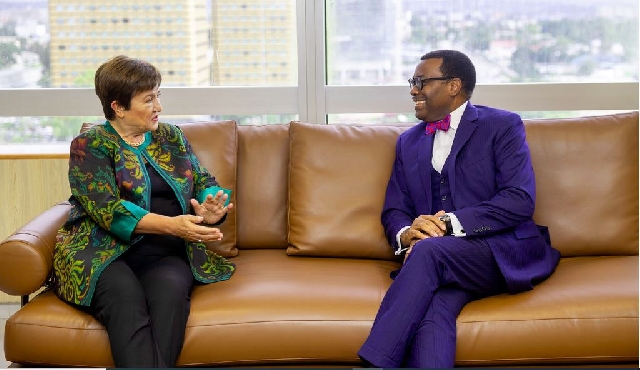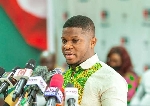Natural resource-backed loans are a disaster for Africa - Warn IMF and AfDB
 Kristalina Georgieva and Adesina
Kristalina Georgieva and Adesina
The International Monetary Fund (IMF) has strongly supported a call by the African Development Bank Group urging countries in Africa to stop borrowing loans backed by their natural resources.
The IMF Managing Director Kristalina Georgieva met last Thursday with the President of the African Development Bank Group, Dr Akinwumi Adesina, in Abidjan, Cote D’Ivoire. It is the first time an IMF head has visited the Bank headquarters since its establishment in 1964.
Welcoming Georgieva, Adesina said, “the natural resource-backed loans are non-transparent, expensive and make debt resolution difficult.” He warned that if the trend continues, “it will be a disaster for Africa.”
Georgieva said the Fund’s senior management team will “carry out a thorough assessment. We will come with a strong voice to tell countries not to create avenues for predatory and enslaving loans.”
She said the issue would also be discussed at the Global Sovereign Debt Roundtable comprised of bilateral creditors, private creditors and borrowing countries. The roundtable is co-chaired by the IMF, World Bank and the presidency of the G20. The African Union joined the G20 in September as a permanent member.
Georgieva is on her way to Marrakech, Morocco, for the World Bank Group and IMF Annual meetings which last held in Africa 50 years ago.
The IMF chief said she is visiting Africa at a time when the continent holds much promise for more dynamic growth in the world.
“We often focus on the challenges that the continent is facing because it is here the impact of climate change is much more severe, where macro-economic and financial instability and debt are amplified.”
“But we want to focus on opportunities in Africa for the simple fact that the capital is in the North and a young population is in the South, primarily here in Africa. Unless we build a bridge for capital to flow to where it is needed most, it could lead to a bigger problem.”
Adesina praised bold efforts by the IMF chief and the US Secretary of Treasury Janet Yellen, at the height of the Covid-19 pandemic in 2021, to shore up the global economy by allocating $650 billion in Special Drawing Rights (SDRs).
Africa, with a population of more than 1.2 billion, received about $33 billion of SDRs, representing only 5 percent of the total allocation, the smallest portion among the different regions of the world.
The African Development Bank continues to lead conversations and develop models that will allow SDRs to be rechanneled through multilateral development banks. MDBs can leverage such resources three to four times their original values. Adesina thanked the IMF for working with the African Development Bank’s team on an initiative that could allow SDRs to be channeled through MDBs.
“Together with the Inter-American Development Bank we developed a model that meets the IMF’s reserve asset status. If you channel $5 billion through the Bank, we will use our leveraging power and that could easily become $20 billion of new financing for Africa,” said Adesina.
The Bank chief said the initiative would provide much-needed support to countries in Africa where post-pandemic debt remains a big challenge. “It’s more serious for low-income countries who constitute the Bank’s concessional lending window, the African Development Fund. They are also the most vulnerable in the world to climate change.”
Georgieva, who has publicly supported the Bank’s initiative on SDRs, said the two institutions will continue to work together to find ways for SDRs to be deployed as hybrid capital.
“I’m on record supporting the Bank’s effort and if this succeeds, there will be a significant expansion of financial capacity for countries even beyond our years in office,” she said.
The African Development Bank Group’s SDR proposal is supported by African leaders as well as UN Secretary General António Guterres.
The IMF chief also commended the Bank’s initiative, in conjunction with the African Union, to establish an African Financial Safety Mechanism to cushion the continent against exogenous shocks such as the impact of Covid-19.
According to Adesina, “Africa is the only region in the world that does not have a safety net against shocks. Europe has it. Asia has it. America has it. The Middle East has it.”
The African Union endorsed the African Development Bank Group’s proposal for the mechanism during its summit in February 2022.
Source: Classfmonline.com
Trending Business

We'll deal with financial challenges in the energy sector – John Jinapor assures Ghanaians
08:52
Western Regional Minister calls for strategic port positioning to boost job creation
05:29
NCSSMAG endorses gov’t GOLDBOD to ensure fair pricing for small-scale miners
03:52
We'll resist any attempt to smuggle in new taxes or increase existing taxes - Minority warns
14:18
Economy: Recent reduction in T-Bills has saved Ghana GH¢1bn - Ato Forson
11:55
National Economic Dialogue is pivotal in Ghana's history - Finance Minister
11:22
Ghana's economic crisis isn’t over; economy needs urgent reset - Ato Forson
11:18
Outcome of 'historic' National Economic Dialogue will find expression in upcoming budget - Ato Forson
09:20
Mahama gov’t has borrowed GH¢67bn from T-bills in two months - Gideon Boako
04:04
Ato Forson’s appointment as Finance Minister right; he’s always been ahead of me - Adongo
08:24




